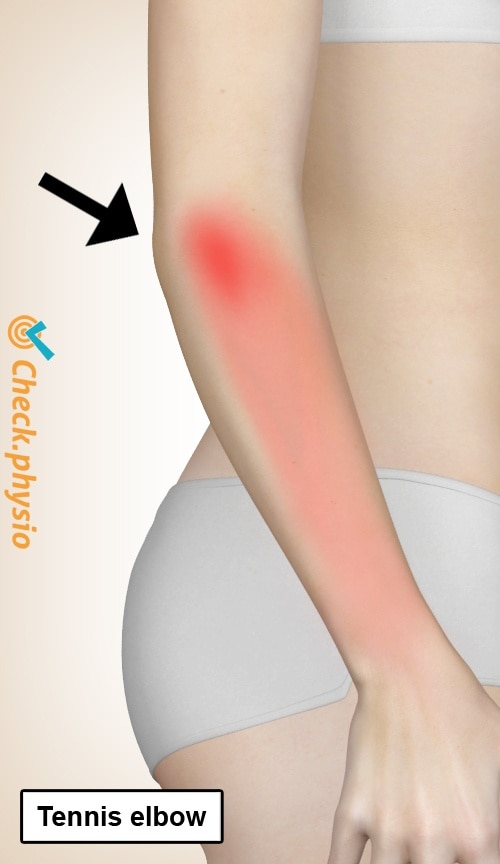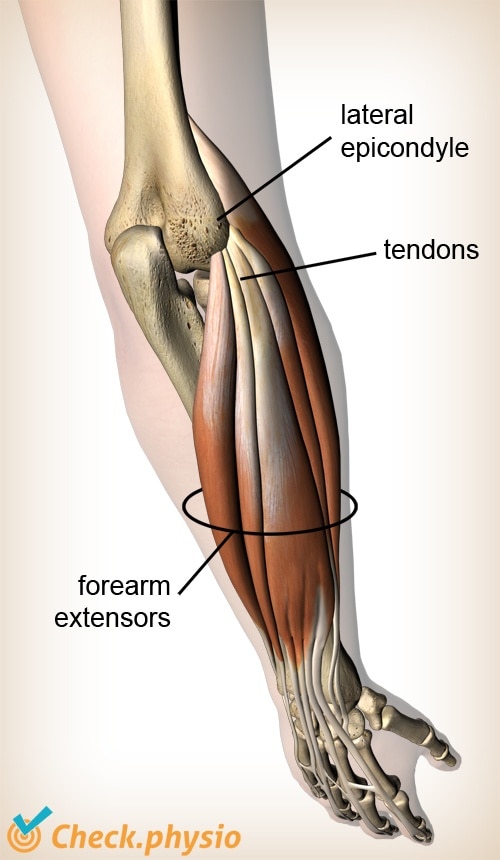Tennis elbow
Lateral epicondylitis / laterale epicondylalgia
Tennis elbow is a common condition resulting in pain along the outside of the elbow. Sometimes the pain radiates into the forearm, wrist and hand.

The term "tennis elbow" is misleading, as only a small number of people with tennis elbow actually play tennis.
Description of condition
The muscles that extend the wrist and fingers are called the "forearm extensors". They run from the hand to the outside of the elbow. There they attach to the bone of the upper arm bone (the humerus) via tendons. This tendon tissue is affected by tennis elbow.
Cause and history
The cause is attributed to repeated tightening of the forearm extensors. This causes prolonged traction on the tendon tissue and the periosteum. The symptoms are usually caused by repetitive movements of the wrist. Things like painting, computer work, gardening, polishing or working with a screw driver.
The symptoms normally develop gradually, but can also occur as an acute condition. Usually this is preceded by a prolonged period of degeneration (= decreased quality) of the tendon tissue, without this resulting in any symptoms.
Signs & symptoms
- Pain along the outside of the elbow, at the level of the lateral epicondyle (this is the hard bony lump on the outside of the elbow).
- The pain may occur when forcefully making a fist (with extended elbows).
- Loss of strength (for example when lifting objects that are grasped from above).
- Pressure on the outside of the elbow may be extremely painful.
- Pain may radiate into the forearm, wrist and hand.
- In some cases, fully bending the elbow is painful.
- Stretching the forearm extensors may provoke the symptoms.
Diagnosis
The diagnosis is confirmed by physical examination. A simple at-home test is lifting a chair with an overhand grip. This results in the typical pain symptoms associated with a tennis elbow.
Treatment
The treatment may include stretching the forearm extensors, and eccentric muscle strengthening exercises. A corticosteroid injection can yield very good short term results. However, long term results are disappointing.
Exercises
Follow the program of exercises here with exercises for tennis elbow.
You can check your symptoms using the online physiotherapy check or make an appointment with a physiotherapy practice in your locality.

References
Cleland, J.A. & Koppenhaver, S. (2011). Netter's orthopaedic clinical examination: an evidence-based approach. 2nd ed. Philadelphia: Saunders Elsevier.
Lohman, A.H.M. (2004). Vorm en beweging. Leerboek van het bewegingsapparaat van de mens. Houten: Bohn Stafleu van Loghum.
Verhaar, J.A.N. & Linden, A.J. van der (2005). Orthopedie. Houten: Bohn Stafleu van Loghum.



